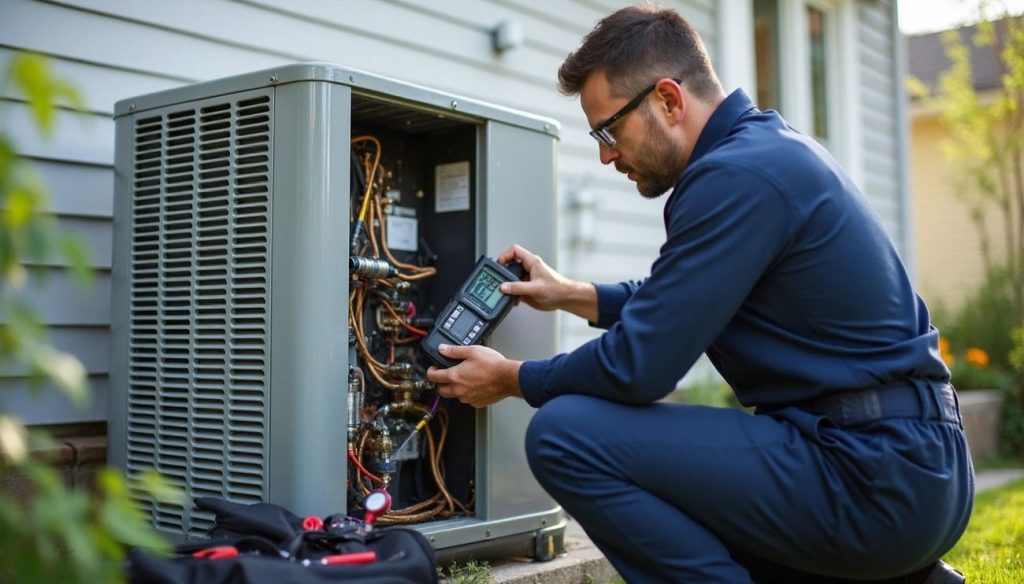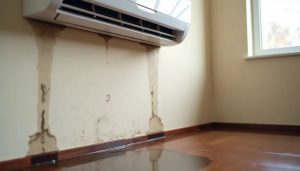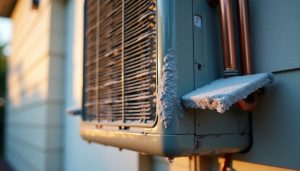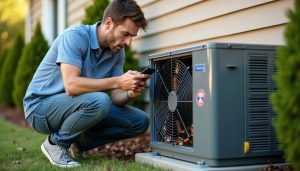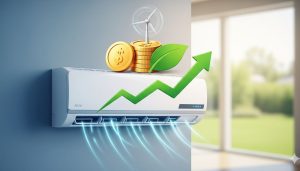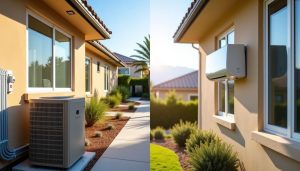Heat pump repair cost might be what brought you here – you’re not alone. Homeowners typically spend $160 to $651 on heat pump repairs, with costs averaging around $405. The good news? These costs are substantially lower than a full system replacement, which could set you back $8,000 to $15,000.
Repair costs are easier to handle than replacement expenses, but you need to know what drives these costs. The final bill varies based on several factors – from simple tune-ups to complex problems like refrigerant leak repairs. On top of that, investing in regular maintenance can help lower your service costs over time.
This piece breaks down what you’ll likely pay for heat pump repairs in 2025. We cover labor rates, common problems, and help you decide between fixing or replacing your unit. Your repair options matter more than ever, especially with new HVAC regulations that could push system prices up by 20-30% in 2025.
What is the average heat pump repair cost in 2025?
The cost of heat pump repairs in 2025 might surprise you, and this piece will help you budget better for maintenance costs. Let’s get into what homeowners actually pay and how to make smart choices between fixing or replacing your unit.
Typical price range for homeowners
Right now in 2025, you’ll pay around $405 on average to fix your heat pump. This standard gives you a starting point, but real costs can vary by a lot based on what’s wrong. Most people end up spending between $160 and $651 when they call for repairs. This range should give you a good idea of what to expect.
Sometimes repair bills fall outside these typical numbers. Simple fixes can cost as little as $69, while bigger problems might set you back up to $2,400. We noticed these differences mostly come down to which part needs fixing and how much work it takes.
Here’s what you might pay to fix specific parts:
- A refrigerant leak will cost $200-$1,000 (plus $200-$500 to refill the refrigerant)
- Fixing a thermostat runs $50-$200, while a new one costs $200-$500
- Replacing capacitors or contactors costs $120-$250
- A new defrost control board ranges from $200-$500
How costs compare to full replacement
Big repair bills might make you wonder if getting a new system makes more sense. A brand new heat pump system costs between $6,000 and $13,000. This is a big deal as it means that most repairs look pretty affordable in comparison.
HVAC pros often suggest using the “$5,000 rule” to decide. Just multiply your repair cost by your system’s age—if you get more than $5,000, a new system might be smarter. To name just one example, see a $900 repair on a 14-year-old system. That’s $12,600, which suggests buying new would save money over time.
Some experts say it’s time for replacement when repairs cost more than half of a new system’s price. This drops to just one-third for older systems that have run through 75% of their expected life.
Why repair is often the smarter choice
Repairs usually make more sense than you might think. The upfront savings are huge—even pricey fixes like a new blower motor ($450-$750) or evaporator coil work ($600-$2,000) cost nowhere near as much as a complete system replacement.
Fixing your current system makes sense when:
- Your heat pump isn’t yet 10 years old
- Repairs will cost less than $1,000
- You just need to replace simple parts like thermostats or capacitors
- You plan to move soon and won’t benefit from a new system’s long-term savings
Repairs can add years to your system’s life. Many parts can be swapped out for much less than a full replacement, which helps put off that bigger expense until you really need it.
A professional opinion is vital here. DIY repairs on complex heat pump issues often create more problems, bigger bills, and safety risks. A qualified tech can spot what’s wrong and help you find affordable solutions that work best for your situation.
Key factors that affect heat pump repair cost
Your heat pump repair bill depends on several key factors beyond the actual problem. Let’s look at what drives these costs so you can better plan for your system’s upkeep.
Type of heat pump system
The design of your heat pump plays a big role in repair expenses. Each system comes with its own complexity level and parts costs:
- Air source heat pumps: Most common type, repairs run $200-$1,600
- Ductless mini-split systems: Repairs typically cost $100-$1,500
- Geothermal heat pumps: More complex repairs range from $200-$2,000
- Water source units: Service costs usually run $200-$1,800
Geothermal systems save energy but repairs cost more because their components are underground and harder to access. Bigger heat pump units need larger replacement parts, which means higher repair costs.
Severity and type of issue
The repair cost relates directly to how complex the problem is. Small fixes cost much less than major component failures. To name just one example:
Quick fixes like clearing a plugged condensate line cost about $100-$200. However, replacing major parts like condenser or evaporator coils runs $600-$1,500 each.
Problems with multiple components naturally cost more. The type of repair also affects the price—a standard blower motor costs around $450 while high-efficiency variable-speed models can reach $1,500.
Age and condition of the unit
Repair costs go up as heat pumps get older. Aging systems bring several money challenges:
Parts become harder to find for older models, which drives up costs. These units often use outdated refrigerants that cost more. Poor maintenance can create a domino effect where one worn part damages others, leading to multiple repairs.
Heat pumps usually last 10-15 years. When your system hits the 10-year mark, you should weigh repair costs against getting a new unit.
Local labor rates and service fees
Labor makes up much of any heat pump repair bill. HVAC pros charge between $75-$150 per hour. These rates change based on:
Where you live and local costs affect prices significantly. Companies often charge minimum trip fees equal to 1-2 hours of work. Simple repairs take 1-2 hours and cost $100-$300 for labor, while bigger jobs needing 4-5 hours can hit $400-$1,500 just for labor.
Timing matters too. Peak season calls might cost 30% more due to high demand. Emergency service at night, on weekends, or holidays costs even more.
Location access is another factor—hard-to-reach heat pumps take longer to fix, which adds to labor costs. Even well-maintained systems in awkward spots cost more to service because technicians need more time to work on them.
Common heat pump repairs and their costs
Your heat pump might start acting up, and knowing repair costs helps you plan your budget better. Let’s look at what common heat pump repairs will likely cost in 2025.
Thermostat replacement
Heat pump problems often start with thermostat issues, especially if they don’t match your system properly. Heat pumps need specific thermostats that work differently from furnaces, especially if you have backup or emergency heating.
Replacement costs vary based on thermostat type:
- Standard thermostats: $30-$60 for parts plus $150-$300 including installation
- Programmable models: $60-$300 for the unit and $250-$750 including installation
- Smart thermostats: Generally $200-$500 installed, offering long-term energy savings
Basic thermostat wiring repairs start at $150. Diagnosing existing thermostat problems usually costs between $50-$200.
Refrigerant leak repair cost
Refrigerant leaks can seriously affect your heat pump’s performance. You might notice bubbling or hissing noises, poor heating or cooling, and a sweet, formaldehyde-like smell near the outdoor unit.
Fixing refrigerant leaks costs between $200-$1,500, depending on several factors:
- Leak detection service: $15-$50
- Type of refrigerant needed: R-22 (phased out, more expensive) at $10-$20 per pound versus R-410A at $4-$6 per pound
- Refrigerant recharge: Additional $200-$500 after the leak repair
Compressor and fan motor issues
Compressor repairs rank among the most expensive heat pump fixes. This vital component costs between $900-$2,900 to replace, with prices varying by type:
- Single-stage compressors: $400-$1,500 plus 2-4 hours of labor
- Two-stage compressors: $550-$2,000 plus installation
Fan motor repairs cost less overall. A condenser fan motor replacement runs $40-$250 for parts plus $250-$650 including labor. Poor airflow or complete system failure usually points to fan problems.
Defrost control board and capacitor fixes
Ice buildup on external coils happens due to defrost control board problems, which reduces efficiency and might damage your system. A new board costs between $200-$650. Look out for:
- Frost buildup or snow on external heat pumps
- Compressor shutdowns during defrost cycles
- Uneven temperatures
Capacitor replacements happen frequently and cost $100-$400 total. The capacitor itself costs little ($6-$50), but labor and service fees make up most of the cost. Your system might have trouble starting, shut down unexpectedly, or behave strangely if the capacitor fails.
Regular maintenance helps prevent these costly repairs. Professional tune-ups cost less than emergency fixes and catch problems early.
Labor and service costs you should expect
Labor expenses make up much of your heat pump repair bill. You should know these service costs in advance to avoid surprises when the invoice arrives.
Hourly rates for HVAC technicians
Professional HVAC technicians charge between $75 and $150 per hour. Several factors affect these rates:
- The technician’s experience and certification level
- The company’s size (larger companies have higher overhead costs)
- Your location and local cost of living
Companies set their labor costs as hourly rates or flat fees. Simple repairs that take 1-2 hours will cost you $100 to $300 in labor. Complex jobs requiring 4-5 hours can reach $400 to $1,500 just for labor.
Trip fees and emergency service charges
HVAC companies charge original service call fees between $75 to $200. This covers sending a technician to your home with equipment and diagnostic tools. Some companies apply this fee toward the first hour of work.
Emergency service calls cost significantly more:
- Weekend or after-hours service costs double to triple the normal rate
- A technician’s regular $75 hourly rate jumps to $150 to $275 per hour for emergency calls
- Some companies add a fixed surcharge for off-hours visits
Your system’s age, complexity, accessibility, and distance from the service provider affect emergency service costs.
Heat pump tune up cost vs. repair
Regular maintenance is nowhere near as expensive as emergency repairs. A heat pump tune-up costs between $75 and $200, with most homeowners paying $150.
Regular maintenance gives you several benefits:
- You catch small problems before they become serious
- Your system lasts longer
- The system runs at peak efficiency
Additional work during tune-ups can increase costs. To name just one example, a refrigerant recharge during maintenance adds about $300 to the bill.
HVAC companies’ maintenance plans offer better rates for regular service. These plans include one or two yearly tune-ups for $150 to $300. This can save you money compared to paying for separate service visits.
When repair isn’t enough: signs you may need replacement
The decision to repair or replace your heat pump depends on several telling signs. Even the best maintenance routine can’t stop your system from wearing down over time.
Frequent breakdowns
Recurring issues show your system might be reaching its final days. Your heat pump needs replacement if you’ve called for professional service more than twice in one season. Multiple failures point to deeper problems that quick fixes don’t solve.
High repair bills vs. new unit cost
You can use these formulas to help make your decision:
- The 50% rule: Replace your unit if repairs cost more than half of a new system.
- The $5,000 rule: Multiply your repair cost by your system’s age in years. A total above $5,000 means replacement is your best option.
- Age-based threshold: Units over 10 years old should be replaced if repairs exceed one-third of a new system’s price.
Looking at current repair costs, spending $2,000 to fix a 3-year-old unit makes sense. The same repair on a 12-year-old system would be a waste of money.
System age and energy efficiency
Heat pumps usually last 10-15 years when properly maintained. In spite of that, even well-kept units lose about 2% efficiency each year. A 10-year-old system costs more to run than newer models, whatever its repair status. Modern SEER2 and HSPF2 ratings show big improvements over older technology. These improvements alone might justify buying a new system through energy savings.
Conclusion
The true costs determine if you should repair your heat pump or not. Most homeowners pay between $160 and $651 for repairs. This cost is nowhere near the $6,000-$13,000 needed for a complete system replacement. Repairing makes more financial sense, especially if your system is less than 10 years old.
Your system’s age is a vital factor in making this choice. You can use the $5,000 rule as a helpful guide – multiply your repair estimate by your system’s age. This calculation shows whether you should repair or replace your unit. Another practical way is to check if repair costs are more than half the replacement value.
You can avoid expensive emergency repairs through regular maintenance. Heat pump tune-ups cost between $75 and $200, which is much less than fixing problems after they get worse. This approach saves money and helps your system last longer.
Your final bill depends on which part needs fixing. Simple thermostat replacements cost $50-$200, while complex refrigerant leak repairs can reach $1,500. These cost ranges help you plan your budget and spot any overcharging.
Labor costs are a big deal as HVAC technicians charge $75-$150 per hour on average. Emergency service calls can cost two or three times more. This high cost shows why preventative maintenance matters so much.
Repairs make sense in many cases, but replacement is smarter when older systems break down often. If your heat pump needs multiple service calls every year, it’s time for a new one, whatever the repair costs might be.
Think over these factors carefully before deciding what to do with your heat pump system. This way, you’ll avoid extra costs while keeping your home comfortable and efficient for years. A qualified HVAC professional can give you the best advice for your specific situation.
FAQs
Q1. What is the average cost of heat pump repairs in 2025? Most homeowners can expect to pay between $160 and $651 for heat pump repairs, with the average cost being around $405. However, costs can vary depending on the specific issue and type of heat pump system.
Q2. How do repair costs compare to full heat pump replacement? Heat pump repairs are generally much more affordable than full replacement. While repairs typically cost a few hundred dollars, a complete system replacement can range from $6,000 to $13,000. Repair is often the more economical choice, especially for systems under 10 years old.
Q3. What factors influence the cost of heat pump repairs? Several factors affect repair costs, including the type of heat pump system, severity of the issue, age and condition of the unit, and local labor rates. For instance, geothermal heat pumps are generally more expensive to repair than air source heat pumps due to their complexity.
Q4. How much do common heat pump repairs typically cost? Common repairs vary in price. Thermostat replacements can cost $50-$500, refrigerant leak repairs range from $200-$1,500, and compressor replacements can be $900-$2,900. Capacitor replacements, one of the most frequent repairs, typically cost between $100-$400.
Q5. Is it better to repair or replace an older heat pump? For heat pumps over 10 years old, replacement might be more cost-effective if repair costs exceed one-third of the replacement price. Consider replacement if you’re experiencing frequent breakdowns or if your system’s efficiency has significantly declined, as newer models offer improved energy efficiency.
References
[1] – https://www.drheating.com/blog/average-repair-costs-for-common-heat-pump-issues/
[2] – https://carrierohio.com/how-much-does-it-cost-to-repair-a-carrier-heat-pump/
[3] – https://www.trane.com/residential/en/resources/blog/heat-pump-repair-cost/
[4] – https://www.heatpumppriceguides.com/repair-costs/
[5] – https://www.hvac.com/expert-advice/heat-pump-capacitor-replacement/
[6] – https://www.homeadvisor.com/cost/heating-and-cooling/repair-a-heat-pump/
[7] – https://skyheating.com/blog/is-heat-pump-repair-expensive/
[8] – https://www.forbes.com/home-improvement/hvac/heat-pump-maintenance-service-cost/
[9] – https://www.hvac.com/expert-advice/heat-pump-repair-costs/
[10] – https://www.callhoover.com/blog/what-is-the-cost-of-emergency-hvac-service/
[11] – https://carriercoolingcenter.com/how-much-does-carrier-heat-pump-repair-cost/
[12] – https://www.angi.com/articles/heat-pump-repair-cost.htm
[13] – https://blog.budderfly.com/defrost-control-board
[14] – https://www.trane.com/residential/en/resources/troubleshooting/heat-pumps/heat-pump-capacitor/
[15] – https://www.angi.com/articles/how-much-does-it-cost-replace-ac-capacitor.htm
[16] – https://homeguide.com/costs/hvac-repair-cost
[17] – https://www.hvac.com/expert-advice/heat-pump-annual-maintenance-costs/
[18] – https://www.thisoldhouse.com/heating-cooling/heat-pump-cost
[19] – https://www.myfivestarhomeservices.com/how-much-will-a-new-hvac-system-cost-in-2025/
[20] – https://thefurnaceoutlet.com/blogs/news/average-hvac-repair-costs-vs-replacement-costs-in-2025?srsltid=AfmBOopN2F45VA0hG_dZSXcEmrDJSqnx1A4PaiNzYpSu4kGWNGg0A6Am
[21] – https://vikingcoldair.com/choosing-between-heat-pump-repair-or-replacement/
[22] – https://modernmechhvac.com/blog/how-decide-between-heat-pump-repair-replacement
[23] – https://indoortemp.com/resources/repair-vs-replace-heat-pump
[24] – https://www.airservicesunlimited.com/blog/heating-service/heat-pump-repair-vs-replacement-whats-best-for-your-home/
[25] – https://www.carrier.com/residential/en/us/products/heat-pumps/how-much-does-a-heat-pump-cost/

